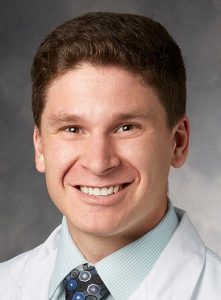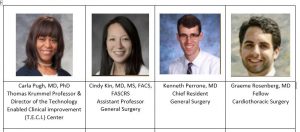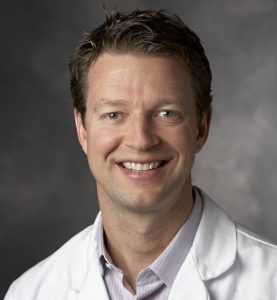Information can be found here: https://www.plasticsurgerythemeeting.com/
Abstracts are due at 11:59 PM PST

Presented by: Daniel Joseph Stoltz, MD, Resident in General Surgery, Department of Surgery
Talk Title: “Preventative Health Screening in Veterans With Obesity Seeking Bariatric Surgery: The Role of a Specialty Surgery Clinic.”
Bio: Dan Stoltz is a Stanford General Surgery resident currently in his second year of Professional Development time. He is funded by the Chan Zuckerberg Biohub Physician-Scientist Fellowship Program, the Division of Abdominal Transplantation, and a Professional Development Resident Award through the Division of General Surgery. Current research interests include translational diagnostics and clinical outcomes in pediatric abdominal transplantation, as well as clinical interventions for obese patients seeking bariatric surgery
Each week, S-SPIRE hosts an in-person Work-In-Progress session (WIP) for faculty members and trainees to present their research and receive feedback on projects in every phase of development—from drafting specific aims pages, to parsing grant review committee comments, to abstracts/papers/methods in preparation.
Please refer inquiries to Ana Mezynski at mezynski@stanford.edu
Title: “The Physiologic Basis of the Operative Experience: The WHOOP Study”
Presented by the WHOOP Study Team:

Each first Monday of every month, S-SPIRE hosts a Zoom Work-In-Progress session (WIP) for faculty members and trainees to present their research and receive feedback on projects in every phase of development—from drafting specific aims pages, to parsing grant review committee comments, to abstracts/papers/methods in preparation.
Please contact Ana Mezynski at mezynski@stanford.edu for Zoom dial-in instructions.
WHO SHOULD SUBMIT:
All current Professional Development Residents, and PGY-3, PGY-4 and PGY-5 categorical residents are required to submit abstracts. Submission is optional for PGY-1 and PGY-2 residents.
Faculty: please encourage non-MD research fellows, postdocs and other mentees in your labs to submit abstracts. Since these trainees are not always on the Department of Surgery email lists, please inform them about this opportunity directly.
ABSTRACT GUIDELINES:
- NEW: Individuals can only submit 2 abstracts each and must be for different projects. We will not accept multiple abstracts for the same project by the same author.
- Abstract is limited to 250 words, excluding the Title, Author(s) or Section Title.
- Each abstract must be submitted by the first author and self-select category clinical/HSR/education or basic/translational.
- Abstracts received after the posted deadlines will not be accepted.
- Revised abstracts will not be accepted after the posted due dates (TBD).
- Contact Information: Joseph Martinez josephm@stanford.edu or Julia Miranda mjulia@stanford.edu if you have any questions.
ABSTRACT SUBMISSION PROCESS:
- Sign into the Stanford G-Suite tool with your Stanford Email to download and submit Holman22 abstract.
- Download the abstract template <<HERE>> and follow the form carefully.
If the abstract form is not followed as is, it will be returned for revisions.
- Submit your completed abstract and key figure <<HERE>>.
One abstract per submission; if you have multiple abstracts, please repeat process.
ABSTRACT SUBMISSION DEADLINE: MARCH 13 @11:59PM

Presented by: Aaron Dawes, MD
Assistant Professor of Surgery, General Surgery, Stanford
Talk Title: “The Effect of Managed Care on Access and Quality for Medicaid Patients with Colon Cancer”
Bio:
Dr. Dawes is a board-certified, fellowship-trained colon and rectal surgeon. He is also an Assistant Professor in the Department of Surgery, Division of General Surgery at Stanford University School of Medicine.
Dr. Dawes treats a wide variety of conditions involving the colon, rectum, and anus, always leveraging the latest evidence and technologies. He is fully trained in minimally invasive surgical techniques–including laparoscopic, robotic, and trans-anal minimally invasive surgery–and strives to employ them, whenever possible, in an effort to reduce pain and shorten recovery.
Each week, S-SPIRE hosts an in-person Work-In-Progress session (WIP) for faculty members and trainees to present their research and receive feedback on projects in every phase of development—from drafting specific aims pages, to parsing grant review committee comments, to abstracts/papers/methods in preparation.
Please refer inquiries to Ana Mezynski at mezynski@stanford.edu

Presented by: Aaron Dawes, MD
Assistant Professor of Surgery, General Surgery, Stanford
Part 2
Talk Title: “The Effect of Managed Care on Access and Quality for Medicaid Patients with Colon Cancer”
Bio:
Dr. Dawes is a board-certified, fellowship-trained colon and rectal surgeon. He is also an Assistant Professor in the Department of Surgery, Division of General Surgery at Stanford University School of Medicine.
Dr. Dawes treats a wide variety of conditions involving the colon, rectum, and anus, always leveraging the latest evidence and technologies. He is fully trained in minimally invasive surgical techniques–including laparoscopic, robotic, and trans-anal minimally invasive surgery–and strives to employ them, whenever possible, in an effort to reduce pain and shorten recovery.
Each week, S-SPIRE hosts an in-person Work-In-Progress session (WIP) for faculty members and trainees to present their research and receive feedback on projects in every phase of development—from drafting specific aims pages, to parsing grant review committee comments, to abstracts/papers/methods in preparation.
Please refer inquiries to Ana Mezynski at mezynski@stanford.edu

Presented by: Thomas Weiser, MD, MPH
Associate Professor of Surgery | Section of Trauma, Critical Care, and Acute Care Surgery
Director of Global Engagement | Department of Surgery
Talk Title: “CLEAN-CS: A cluster-randomized stepped wedge interventional trial evaluating an adaptive, multimodal intervention to reduce postoperative infections following cesarean delivery in Ethiopia”
Bio:
Dr. Thomas Weiser is a general and trauma surgeon, and surgical intensivist. He treats and cares for injured patients and those with acute surgical emergencies as well as manages critically ill surgical patients in the Intensive Care Unit.
His research is focused on evaluating the role surgical care plays in the delivery of health services in resource poor settings, in particular low and middle income countries. He is interested in barriers to access and provision of surgical care, the quality of surgical services, and outcomes research as well as the science of implementation, how improvements can be made, and how to strengthen compliance with best practices and change behaviors for the better. He also has an interest in domestic policy as it relates to trauma outcomes, trauma systems, insurance coverage and costs of care, and firearm violence.
Each week, S-SPIRE hosts an in-person Work-In-Progress session (WIP) for faculty members and trainees to present their research and receive feedback on projects in every phase of development—from drafting specific aims pages, to parsing grant review committee comments, to abstracts/papers/methods in preparation.
Please refer inquiries to Ana Mezynski at mezynski@stanford.edu
Each first Monday of every month, S-SPIRE hosts a Zoom Work-In-Progress session (WIP) for faculty members and trainees to present their research and receive feedback on projects in every phase of development—from drafting specific aims pages, to parsing grant review committee comments, to abstracts/papers/methods in preparation.
Please contact Ana Mezynski at mezynski@stanford.edu for Zoom dial-in instructions.